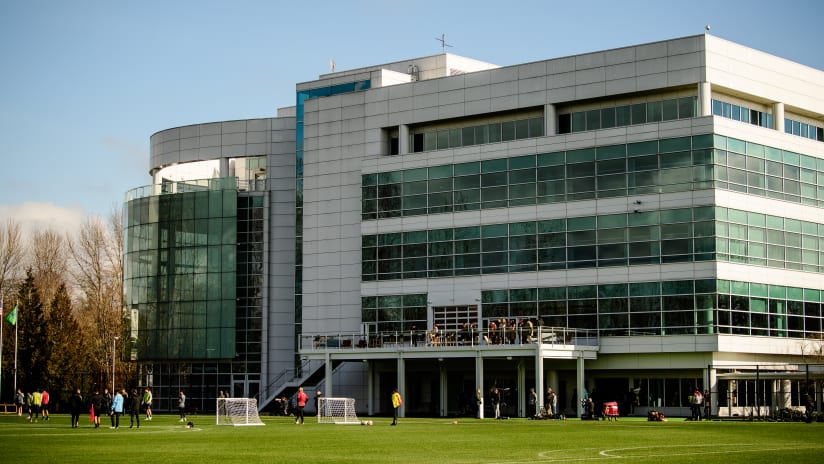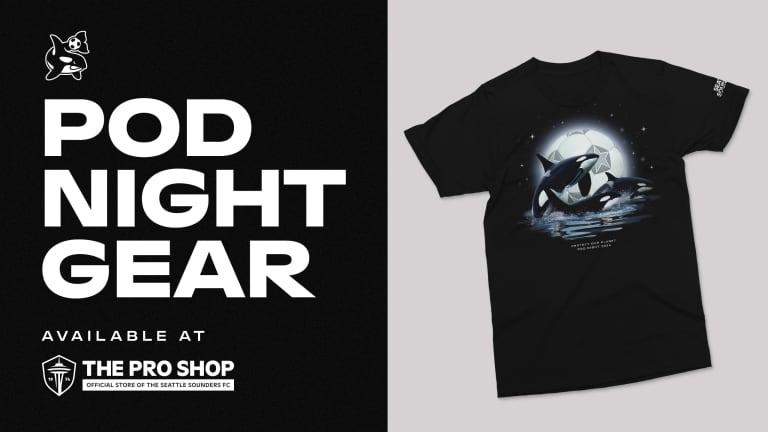The original stewards of the land upon which the Providence Swedish Performance Center and Clubhouse sits, the Duwamish and related Coast Salish peoples lived innately connected to the water and its resources.
From building their homes along its shores to sourcing their food from its inhabitants, the waterways that make up the Puget Sound served as the foundation for the rich culture of the Duwamish and related Coast Salish groups.
Dating back to time immemorial, the people of the Greater King County area have carried a deep connection with the local aquatic ecosystem. Now, the Sounders are working to maintain this history and cultivate a more sustainable, healthier planet.
In alignment with the club’s commitment to Protect Our Planet, the Sounders have embraced the unique opportunity presented in the development of its new home in Renton to lead the way in promoting healthy watershed health by developing the site as a Salmon-Safe certified project.
Founded by river and native fish conservation organization Pacific Rivers, Salmon-Safe is a leading U.S. regional eco label focused on West Coast protection of water quality and wildlife habitat. Salmon-Safe offers peer reviewed certification programs across multiple land use sectors including urban development with a focus on environmentally innovative stormwater design, pollution-prevention in construction, urban ecology, and enhancement of site climate resiliency. To achieve certification, a site is evaluated in relation to its local environment and how it specifically impacts its nearby waterways, and, in this case, ultimately the larger ecosystem of the Puget Sound.
“We’re looking at each site that pursues Salmon-Safe certification as a part of something bigger,” said Salmon-Safe Certification Director Anna Huttel. “Looking beyond the individual site and seeing how it’s connected in that watershed context. What is the impact of that downstream?”
The process of receiving Salmon-Safe certification proved to be thorough and collaborative, with work beginning in early 2023. The Salmon-Safe certification team, composed of interdisciplinary scientists with expertise in aquatic ecosystems, innovative stormwater management, and urban ecology, began the process by reviewing the initial facility design plans and providing feedback.
“It was a long labor of love. A process that really involved the whole interdisciplinary design, development and construction teams,” said Huttel when reflecting upon the certification process. “We were invited with open arms to provide feedback and there was a lot of genuine listening and reception.”
The early involvement of Salmon-Safe granted the club the opportunity to make intentional choices pertaining to the construction of the new facility. Choosing the club’s general contractor was one of the deliberate decisions made, with Venture standing out amongst its peers in its commitment to environmental sustainability.
“Venture is a Salmon-Safe contractor and environmental leader in the large-scale construction sector in the Puget Sound,” said Salmon-Safe Co-founder and Executive Director Dan Kent. “They are committed to zero sediment runoff across operations and applied those innovative practices at the Sounders project.”
The largest and most visible intentional choice made in the construction of the facility involved the two artificial fields on-site. Traditional artificial fields use a crumb rubber infill made from tire scraps. At the Providence Swedish Performance Center and Clubhouse, the artificial fields use the more environmentally friendly option: cork infill that helps maintain clean waterways and protects salmon because it is free of a chemical found in tires.
According to Salmon-Safe representatives, the decision to use the cork infill was monumental in the club gaining its certification, making it one of the first clubs in the league to do so.
The facility is also equipped with several measures to help improve water quality, including the use of native plant species, oil pollution filters and a bioretention water quality treatment center. Together, these measures work to ensure that stormwater runoff is treated to keep pollutants out of downstream waterways and the area is suitable for native plant and animal species.
Earning this certification was paramount for the club as it works toward environmental sustainability and justice, especially pertaining to the Salish Sea and its orca inhabitants — the latter of which is endangered and suffering from a lack of its preferred food, salmon.
“The Sounders as a leader in the community have the opportunity to influence others around the Puget Sound and beyond,” Kent expressed when considering the impact of the Providence Swedish Performance Center and Clubhouse becoming Salmon-Safe certified. “If there was a Cascadia Cup of conservation, I think the Sounders would be in front.”
Though now certified, the work does not end there. Sounders and Salmon-Safe are engaged in an ongoing partnership to continue to adopt best practices to positively impact the local aquatic ecosystems. Similarly, the club has leveraged its partnerships with other local experts, such as EarthGen and the Seattle Aquarium, to take larger strides in its environmental efforts and ultimately support orca conservation.
This Earth Month, fans are invited to engage with the club’s efforts on matchday as we celebrate our unique ability to live and play at the Water’s Edge and highlight the club’s continued work to Protect Our Planet on Pod Night.
Those interested in celebrating our community’s majestic orca residents alongside the club can take advantage of an exclusive ticket offer that comes with a ticket to the April 20 match against Vancouver and an exclusive Pod Night themed scarf.







